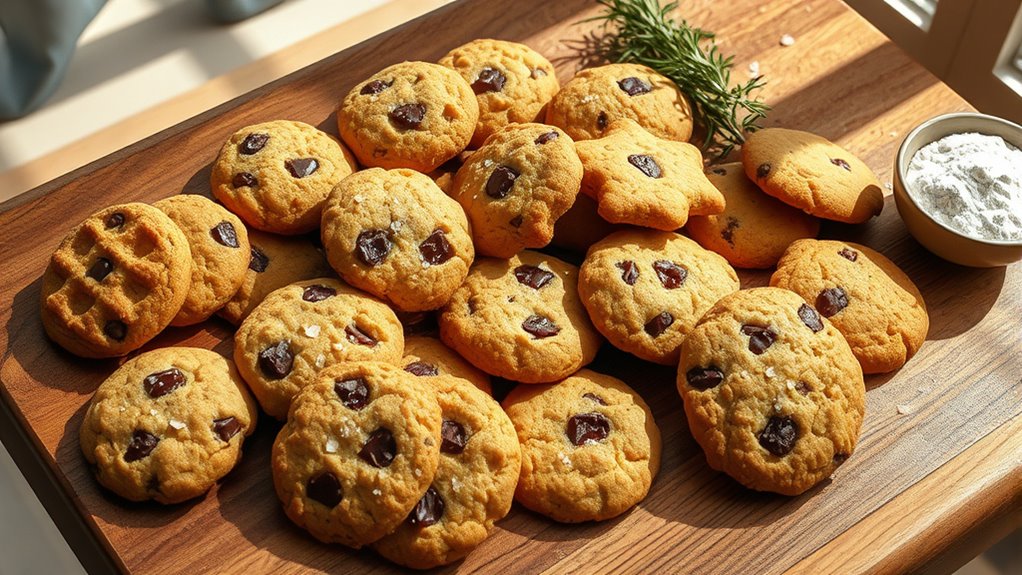If you want to bake the top 10 cookie recipes, start by mastering key ingredients like the right balance of flour, sugar, and butter for perfect texture. Prep your workspace, preheat your oven to 350°F, and cream butter with sugar until fluffy before folding in the flour gently. Chill your dough for better flavor and shape, then enjoy serving your treats with a splash of milk or dipping sauces. With some simple tips, you’ll soon be ready to explore even more delicious cookie ideas.
Ingredients and Quantity
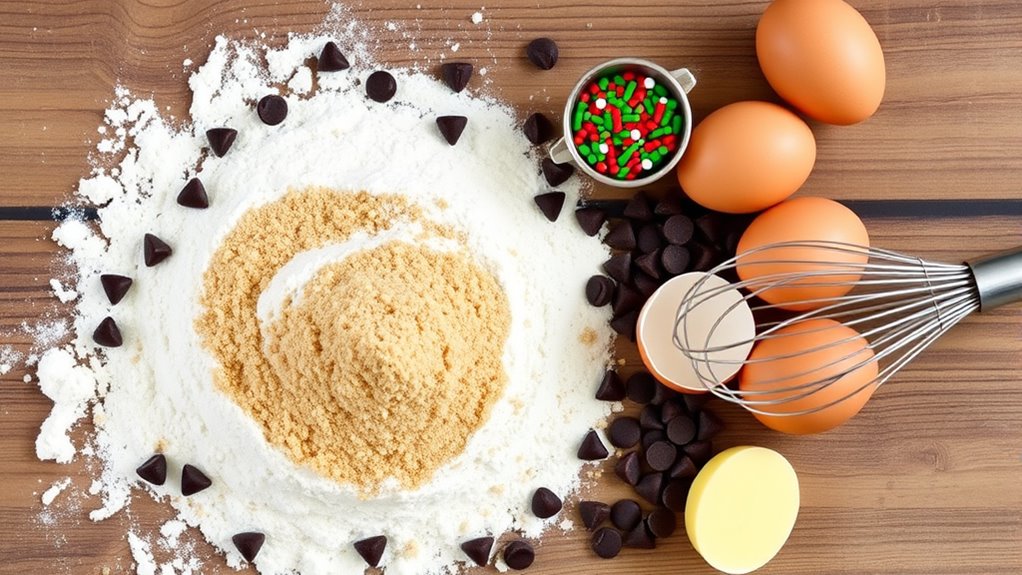
When you bake cookies, the ingredients and their quantities make all the difference between a chewy treat and a crumbly mess. Whether you’re aiming for classic chocolate chip or adventurous flavor variations, precise measurements reveal the cookie types you crave. Balancing sugar, butter, and flour shapes texture and taste, giving you the freedom to experiment without risking failure.
| Ingredient | Typical Quantity | Effect on Cookie |
|---|---|---|
| Flour | 1 – 2 cups | Structure and chewiness |
| Sugar | ½ – 1 cup | Sweetness and crispness |
| Butter | ½ – 1 cup | Moisture and richness |
Mastering these basics lets you customize cookie types boldly, creating your perfect batch every time.
Preparations
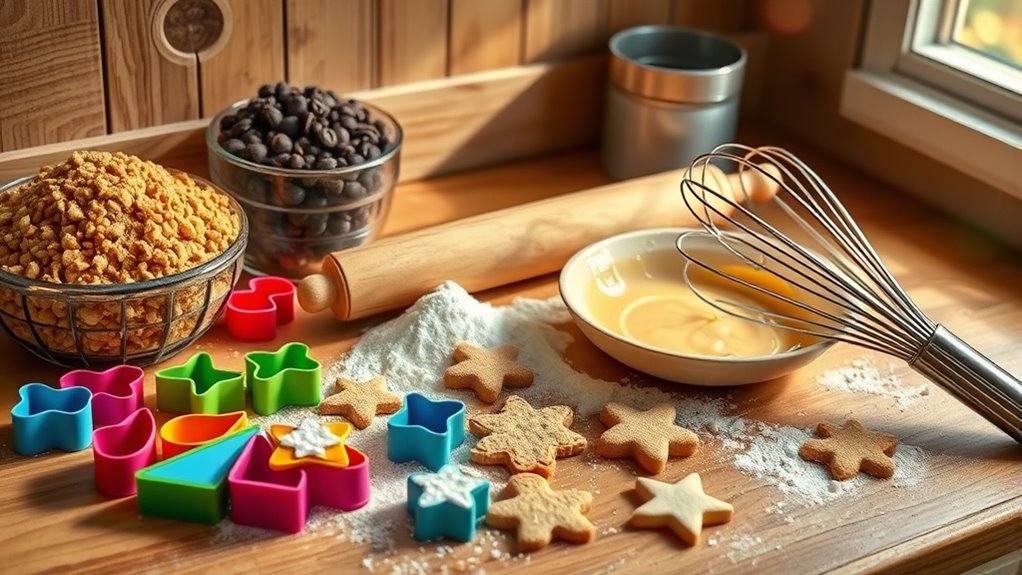
Before you plunge into mixing your ingredients, it’s important to prepare your workspace and tools thoughtfully. Clear your counter, gather your bowls, measuring cups, and spoons, and preheat your oven, keeping in mind any baking temperature adjustments your recipe suggests. Mastering cookie preparation techniques starts with this mindful setup. It’s not just about convenience—it’s about creating an environment where your creativity flows freely. When you adjust baking temperatures, remember it affects texture and baking time, so keep an eye on your cookies as they bake. By staying organized and aware of these details, you’ll enjoy the process more and get better results. Preparing well sets the stage for your cookies to turn out just the way you want—crispy edges, chewy centers, or whatever your heart desires.
How to Prepare
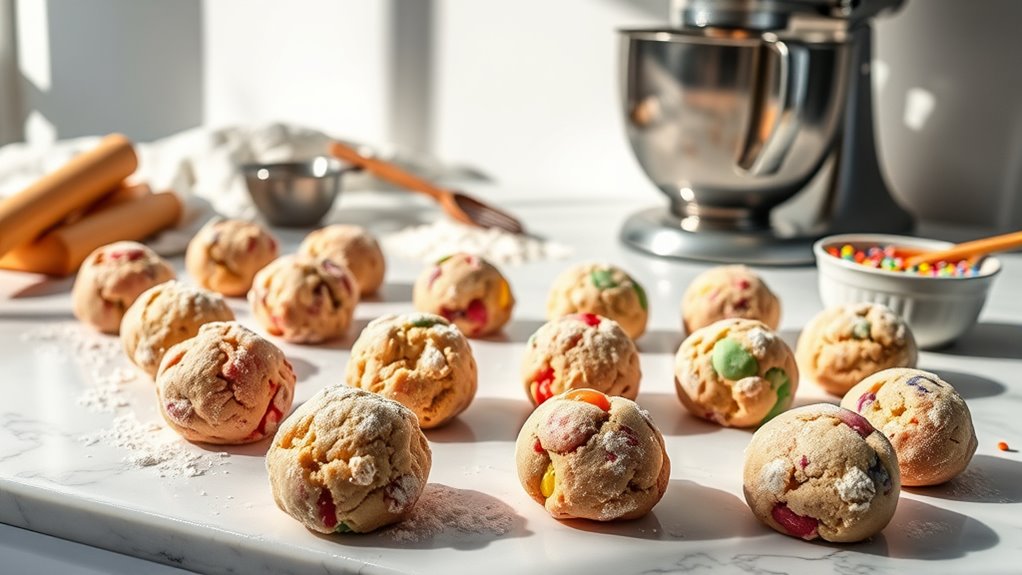
- Ensure your workspace is set and tools are ready before starting.
- Master mixing techniques:
- Cream butter and sugar until light and fluffy.
- Fold in flour gently to maintain texture.
- Take your time during mixing to achieve the perfect dough consistency.
- Consider baking temperatures carefully:
- Most cookies bake best around 350°F.
- Lower temperatures result in softer cookies.
- Higher temperatures produce crisp edges.
- Experiment with mixing techniques and baking temperatures to craft cookies tailored to your taste and mood.
How to Serve
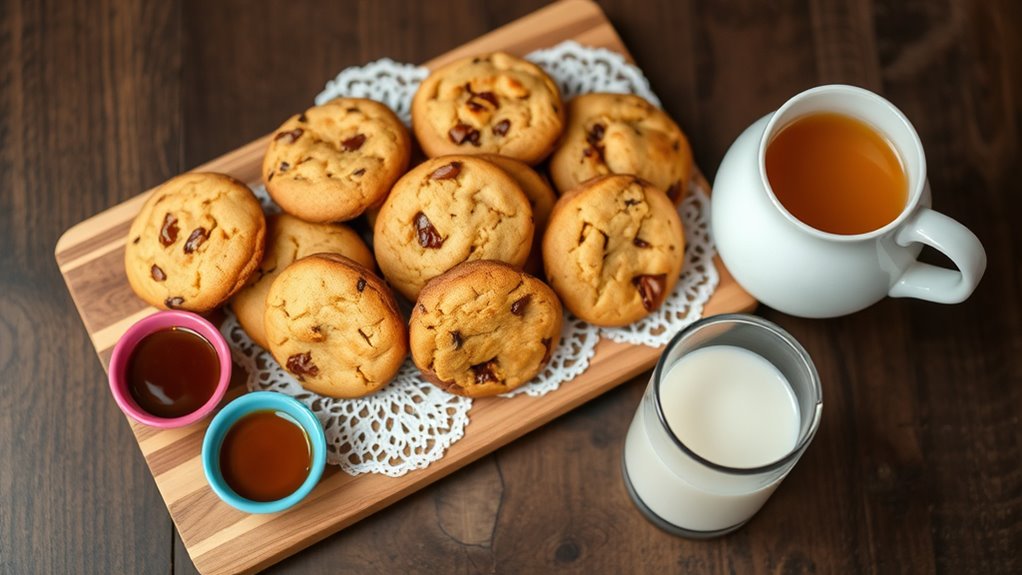
Although cookies are delicious straight from the oven, how you serve them can make all the difference in creating a memorable treat. Your cookie presentation sets the tone, turning simple bites into an experience. Think beyond just a plate—let your serving suggestions inspire freedom and creativity. Consider these ideas:
- Arrange cookies on a rustic wooden board for a casual vibe
- Pair with small bowls of dipping sauces like chocolate or caramel
- Stack and tie with twine for a charming gift-ready look
- Serve alongside a chilled glass of milk or a steaming cup of tea
- Use colorful napkins or doilies to add a pop of fun
Tips
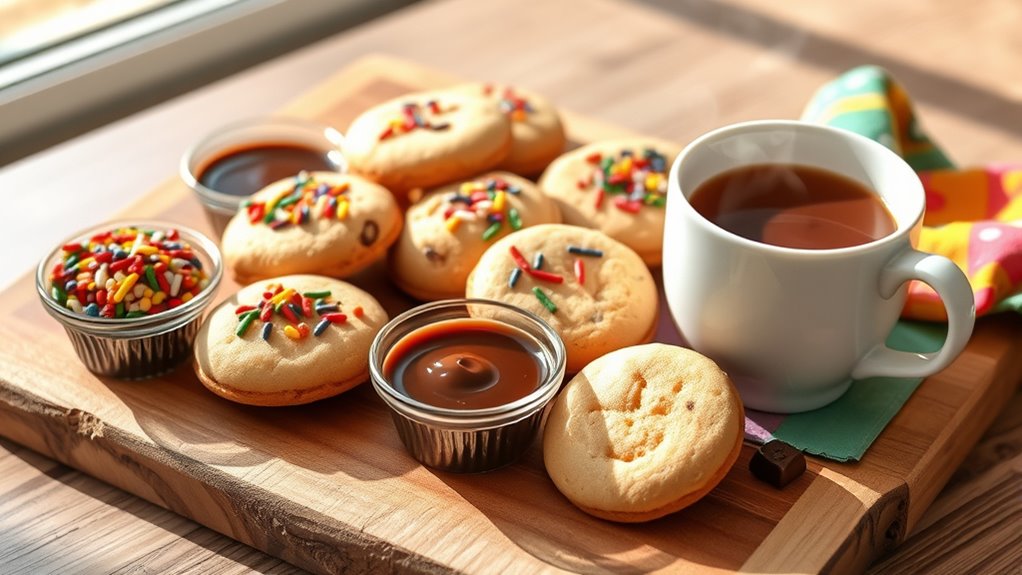
Presenting your cookies beautifully is just one part of the equation; mastering a few simple tips can elevate your baking game even further. Start by experimenting with baking techniques like chilling your dough before baking—it helps control spread and intensifies flavor. Don’t hesitate to mix things up with flavor variations; a pinch of sea salt or a dash of cinnamon can transform a classic cookie into something unforgettable. Use parchment paper to guarantee even baking and easy cleanup. Keep an eye on your oven’s quirks, as temperature differences affect results. Finally, trust your instincts—baking is as much art as science, so feel free to tweak recipes to suit your taste. These tips give you the freedom to create cookies that are uniquely yours.
Food Value and Benefit
Prepared cookies made with nutrient-rich ingredients offer significant food value by providing essential vitamins, minerals, fiber, healthy fats, and antioxidants. Incorporating whole grains, nuts, seeds, dried fruits, natural sweeteners, and spices enhances the nutritional profile of these treats.
Benefits of eating this recipe include:
- Supports digestive health due to high fiber content from whole grains like oats or whole wheat
- Provides heart-healthy fats and protein from nuts and seeds, aiding in muscle repair and sustained energy
- Supplies natural antioxidants from dried fruits, which help combat oxidative stress and inflammation
- Offers a natural source of vitamins such as vitamin E (from nuts and seeds), B vitamins (from whole grains), vitamin C and vitamin A (from dried fruits)
- Delivers essential minerals including magnesium, potassium, iron, and zinc, important for bone health, immune function, and metabolism
- Contains anti-inflammatory and blood sugar-regulating compounds from spices like cinnamon and ginger
Frequently Asked Questions (FAQ)
1. What are the top 10 cookie recipes featured in the article?
The article highlights a variety of cookie recipes that cater to different tastes and preferences. Some of the top recipes include classic Chocolate Chip Cookies, Oatmeal Raisin Cookies, Peanut Butter Cookies, Snickerdoodles, and more unique options such as Matcha Cookies and Red Velvet Cookies. Each recipe is chosen for its popularity and ease of preparation.
2. Are these cookie recipes suitable for beginners?
Yes, the cookie recipes featured in the article are designed to be beginner-friendly. Each recipe includes detailed step-by-step instructions and tips for success, making it easy for anyone, regardless of their baking experience, to create delicious cookies.
3. Can I customize these cookie recipes to suit my dietary needs?
Absolutely! Many of the cookie recipes can be customized to accommodate various dietary restrictions. For example, you can substitute regular flour with gluten-free flour, use coconut oil instead of butter for a dairy-free option, or replace sugar with a natural sweetener like honey or maple syrup. The article also offers suggestions for common substitutions.
4. How can I ensure my cookies come out perfectly every time?
To achieve perfect cookies, it’s essential to measure your ingredients accurately, use fresh ingredients, and follow the baking times provided in the recipes. Additionally, make sure to preheat your oven and consider using an oven thermometer to ensure accurate temperatures. Allowing the dough to chill before baking can also improve texture and flavor.
5. Can these cookie recipes be made in advance and stored?
Yes, many of the cookie recipes can be made in advance. You can prepare the dough ahead of time and refrigerate or freeze it for later use. Once baked, cookies can be stored in an airtight container at room temperature for several days or frozen for longer-lasting freshness. The article provides specific storage tips for each recipe to help you enjoy them at their best.
References
- https://en.wikipedia.org/wiki/Cookie
- https://www.foodnetwork.com/recipes/articles/50-cookie-recipes
- https://www.nytimes.com/wirecutter/blog/best-cookie-recipes/
- https://www.seriouseats.com/cookie-recipes-5117463
- https://www.kingarthurbaking.com/recipes/cookies
- https://www.bbcgoodfood.com/recipes/collection/cookie-recipes
- https://www.cookinglight.com/recipes/cookie-recipes
- https://www.thespruceeats.com/cookie-recipes-5072590
- https://www.foodandwine.com/recipes/cookies
- https://www.joyofbaking.com/Cookies.html
